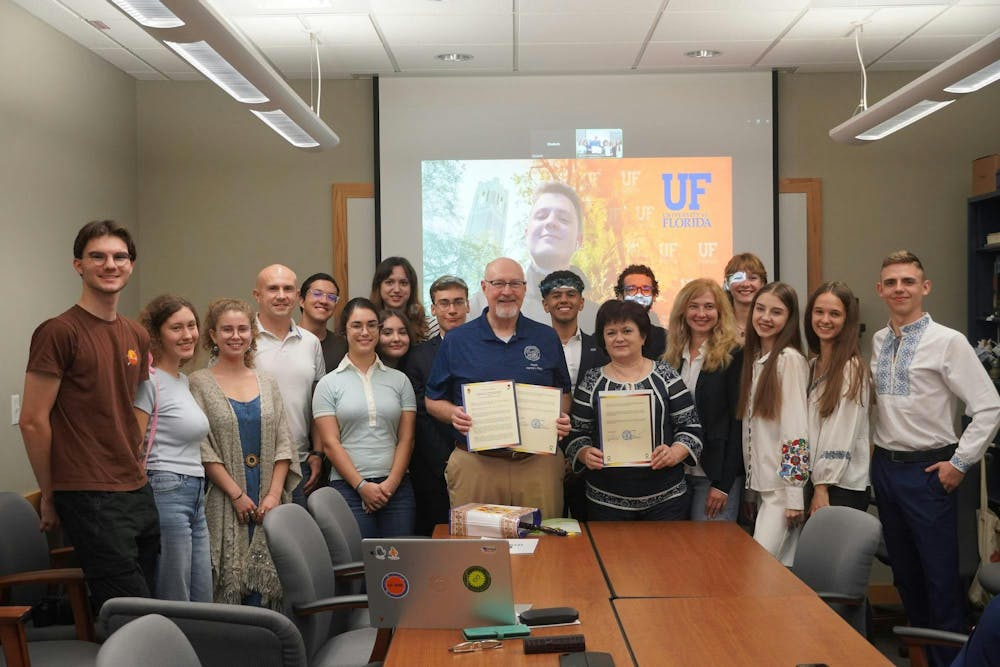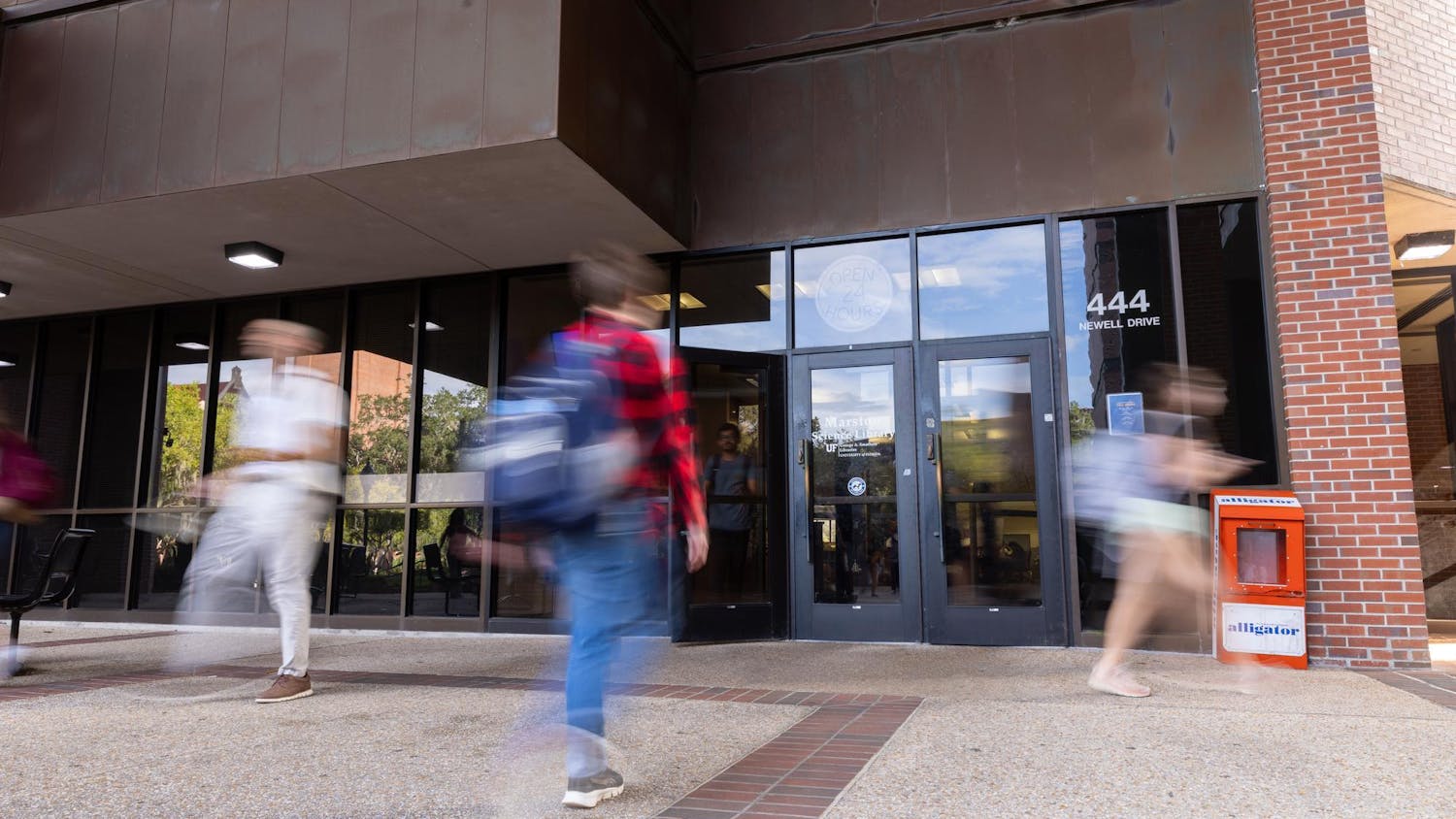Over the course of 1,000 days, hundreds of thousands of men, women and children have learned to adapt to a new reality — one where classes are held in bomb shelters and the sounds of air sirens are more common than not.
It’s the new normal for Ukraine, but some people don’t think it has to be. Across the ocean in Gainesville, a group of UF students are working to help Ukraine return to the normal it knew before Feb. 24, 2022.
Mikhail Mikhaylov, a 22-year-old fifth-year UF engineering student, was born in Russia and has always been proud of his heritage. When his home country invaded Ukraine in 2022, he said his nationalism remained strong, but he felt like he was in a “weird bubble” as he watched the conflict unfold between those he loved and cared for in Eastern Europe.
Mikhaylov watched as some of the people he knew with his same background strayed away from discussing the war and getting involved, but he wasn’t sure if he wanted to do the same.
“I think [in] 20, 30 years if I’m asked, ‘Hey, why didn’t I do something about this?’ I want to have an answer,” he said.
When he couldn’t find one, he got to work. As Mikhaylov was discovering ways to get involved, he said he was approached by some of his friends who were also Russian and shared his commitment to helping Ukraine.
“We all had a sense of guilt for not helping enough, a responsibility to say or do something, but also a sense of hopelessness,” he said.
Ukraine rebuilding initiative
When he and his friends began brainstorming how to take action, Mikhaylov said they started by taking notice of their strengths. The group found a way to combine their interests and fields to form the Ukraine Rebuilding Initiative at UF, of which Mikhaylov is now president.
Mikhaylov said the organization’s main mission is to provide humanitarian support to Ukraine while providing a support opportunity for the Gainesville community. To ensure its goals are achieved, Mikhaylov said, five divisions were established within the organization.
The first division is engineering, which reflects the interest of one of the founders. In this department, members collaborate with local engineers to construct bomb shelters. They have already completed 3D blueprints for the design and are now communicating with students and engineers based in Nizhyn, Ukraine, to finalize an appropriate location in Ukraine for the shelters.
The second division is prosthetics, where Ivan Perevorukhov, a UF student interested in bioengineering, is partnering with Gainesville Prosthetics and General Relief in Prosthetics at UF to create a prosthetic limb for a veteran who served in the Ukrainian war. The team has already met with the veteran and completed 3D scans of his counterpart limbs to get accurate measurements.
The third is a cultural affairs division that is working to create a “memorandum of understanding” between the UF International Center and Nizhyn Gogol State University in Ukraine. Through the memorandum, URI aims to establish a cultural exchange program. Mikhaylov said they hope to have students from both countries educated in the other language to help foster conversations, especially with those in high levels of distress due to the war.
There is also an agriculture division, where members are experimenting with artificial intelligence to construct an AI-powered submarine drone. Working with high school students in Nizhyn, the URI plans to use the submarine to test water quality in locations affected by the war, primarily using Nizhyn as a case study.
The fifth and final division is public health. Within this department, students are collaborating with Gators for Refugee Medical Relief and Feeding Futures to raise about $3,000 to send medical and nutrition-based packages to Ukraine. If the fundraising goal is met, Mikhaylov said, URI would also like to send books to those impacted by the lack of literature due to the war.
“We’re definitely making the right steps,” Mikhaylov said. “Now it’s about making sure that we’re going to the finish line, and everything that we set out to do is actually being check-marked, and we’re saying, ‘Hey, we’ve actually accomplished this. Let’s see what else we can do.’”
Sister city partnership
As members of the URI worked to bring their goals to fruition, Mikhaylov began an internship that brought him to Washington, D.C. While he was there, he had the opportunity to meet Oleksandr Kodola, the mayor of Nizhyn, and share the work he and his team were completing in Gainesville.
After hearing the ambitious plans, Mikhaylov said, Kodola shared how Nizhyn had just become sister cities with the City of State College. Intrigued by the idea, Mikhaylov proposed that he and his team use their resources in a potential sister city partnership with Nizhyn and Gainesville.
On Oct. 31, Gainesville Mayor Harvey Ward signed a memorandum that officially united the two cities as sister cities, making it Gainesville’s 10th sister city. Although a significant step toward promoting cultural exchange, Mikhaylov said this is just the beginning.
Although this step is only the beginning, getting the signature on the memorandum was a journey within itself. In order to receive Ward’s endorsement, which was needed to officially establish the sister city relationship, Mikhaylov said he and the URI worked with the former mayor of Gainesville, Lauren Poe. As he was ending his term in 2023, Poe said he recognized that there was a need for an organization to serve the international community.
Data USA reported that in 2022, 11.2% of the population in Gainesville was foreign-born. Poe said he noted that while he was mayor, little was done to lift up and listen to the international residents. So, he created an organization called Greater Gainesville International Center, which “will celebrate and elevate our diverse international community by serving as a hub between cultural, economic, educational and governmental partners to unlock the full potential of our unique global city.”
One of the ways the organization accomplishes this is through initiating sister city partnerships. Nizhyn is Gainesville’s 10th sister city and was established during the Russia-Ukraine war. In the midst of the conflict, as well as other instances of global tension, Poe said there was pressure to terminate relationships.
“What we try to remind people is we connect humans,” Poe said. “We don’t connect governments. We don’t connect ideologies. We connect people.”
This isn’t the only instance of Gainesville being sister cities with two countries at war. The city is also partnered with Qalqilya, Palestine, and Kfar Saba, Israel. Poe said Gainesville’s relations are not intended to resolve conflict. What they do look at, however, is rebuilding once the violence ceases.
“At some point, the war will end, and people have to start thinking about how… [we] rebuild and create a better future,” Poe said. “If we can play a small part in that and help people work toward peace and mutual understanding and mutual respect, then that’s where we’ll focus our efforts.”
Here in Gainesville, more than 5,000 miles away from Nizhyn, Poe’s motivation to reach peace stood out to one University of Florida student. Solomiya Maykovych, a 19-year-old biology sophomore, was born in Lviv, Ukraine, before she and her parents moved to Florida when she was only 2 years old. Other than her immediate family, almost all of her relatives are still in Ukraine. When Russia invaded Ukraine in February 2022, Solomiya said the feeling of sadness consumed her for a while. As time progressed, her feelings faded as the number of lives lost faded into mere statistics.
However, when she heard of the recent sister city partnership, she said it not only surprised her, but also made her want to get more involved with her Ukrainian roots.
“I thought a sister city means a partnership — working together,” Maykovych said. “I thought maybe that’s just donating money or fundraising. But this — hearing how involved it is and all these different aspects of it … It’s really cool to know that’s happening, and that that could really help Ukraine.”
Sister Cities International defines a sister city relationship as a “broad-based, long-term partnership between two communities in two countries.” While Maykovych’s first impression isn’t necessarily wrong, Mikhaylov said, the partnership holds even more meaning — an intention to heal and rebuild.
As the Russia-Ukraine war comes closer to its three year mark, Mikhaylov said he will continue to dedicate his efforts to helping Ukraine rebuild from the mass destruction it's seen.
“I want to help heal communities that are tarnished by war,” Mikhaylov said. “I want to make sure that peace is the essence, because I truly believe that war is the tongue of a failed diplomat, and now that the diplomats have failed, students like [myself] have to stand up and do something about it. Real victory is not achieved through battles won, but it’s about wars avoided altogether.”
Until peace is reached, Mikhaylov and the Ukraine Rebuilding Initiative will be working to make strides toward restoration for when that day comes, one innovation at a time.
Contact Tanya Fedak at tfedak@alligator.org. Follow her on Twitter @ttanyafedak.
Tanya Fedak is the Spring 2025 Avenue editor and third-year journalism major. You might also recognize her from WUFT, where she's an anchor and reporter. When she's not on the clock, you can find her rereading "Me Before You" or planning her next trip to NYC.






